新北师大版九年级英语第一单元讲解
英语北师大版九年级教案Unit 1 Learning to learn(Ⅰ).
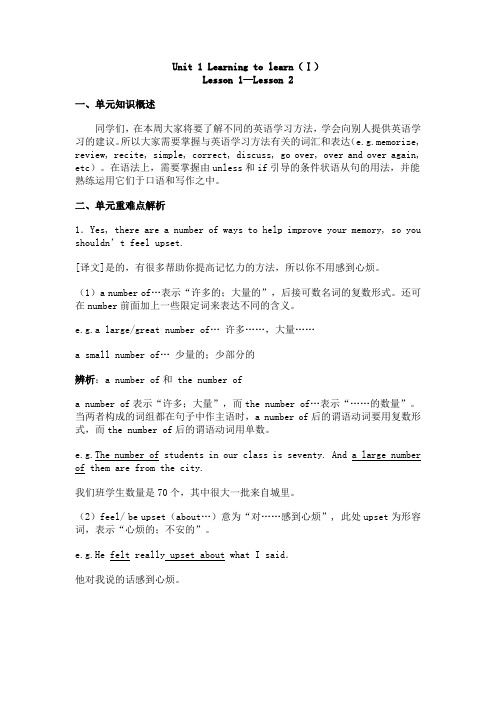
Unit 1 Learning to learn(Ⅰ)Lesson 1—Lesson 2一、单元知识概述同学们,在本周大家将要了解不同的英语学习方法,学会向别人提供英语学习的建议。
所以大家需要掌握与英语学习方法有关的词汇和表达(e.g.memorize, review, recite, simple, correct, discuss, go over, over and over again, etc)。
在语法上,需要掌握由unless和if引导的条件状语从句的用法,并能熟练运用它们于口语和写作之中。
二、单元重难点解析1.Yes, there are a number of ways to help improve your memory, so you shouldn’t feel upset.[译文]是的,有很多帮助你提高记忆力的方法,所以你不用感到心烦。
(1)a number of…表示“许多的;大量的”,后接可数名词的复数形式。
还可在number前面加上一些限定词来表达不同的含义。
e.g.a large/great number of… 许多……,大量……a smal l number of… 少量的;少部分的辨析:a number of和 the number ofa number of表示“许多;大量”,而the number of…表示“……的数量”。
当两者构成的词组都在句子中作主语时,a number of后的谓语动词要用复数形式,而the number of后的谓语动词用单数。
e.g.The number of students in our class is seventy. And a large number of them are from the city.我们班学生数量是70个,其中很大一批来自城里。
(2)feel/ be upset(about…)意为“对……感到心烦”, 此处upset为形容词,表示“心烦的;不安的”。
北师大版初中英语九年级上册Unit 1 Language 词汇精讲
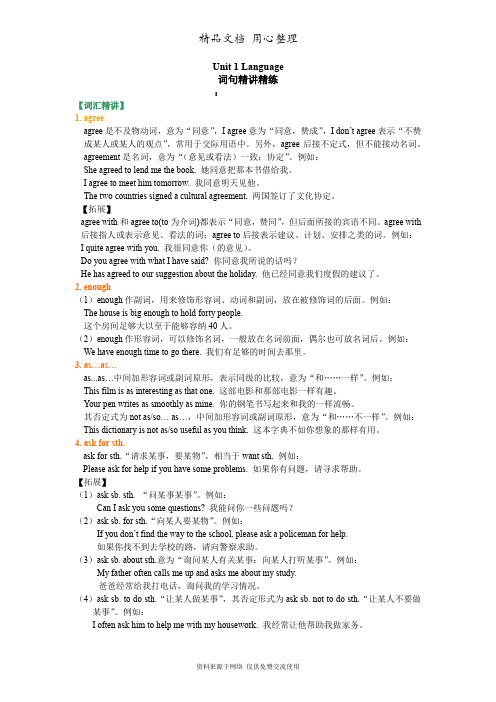
Unit 1 Language词句精讲精练:【词汇精讲】1. agreeagree是不及物动词,意为“同意”,I agree意为“同意,赞成”,I don’t agree表示“不赞成某人或某人的观点”,常用于交际用语中。
另外,agree后接不定式,但不能接动名词。
agreement是名词,意为“(意见或看法)一致;协定”。
例如:She agreed to lend me the book. 她同意把那本书借给我。
I agree to meet him tomorrow. 我同意明天见他。
The two countries signed a cultural agreement. 两国签订了文化协定。
【拓展】agree with和agree to(to为介词)都表示“同意,赞同”,但后面所接的宾语不同。
agree with 后接指人或表示意见、看法的词;agree to后接表示建议、计划、安排之类的词。
例如:I quite agree with you. 我很同意你(的意见)。
Do you agree with what I have said? 你同意我所说的话吗?He has agreed to our suggestion about the holiday. 他已经同意我们度假的建议了。
2. enough(1)enough作副词,用来修饰形容词、动词和副词,放在被修饰词的后面。
例如:The house is big enough to hold forty people.这个房间足够大以至于能够容纳40人。
(2)enough作形容词,可以修饰名词,一般放在名词前面,偶尔也可放名词后。
例如:We have enough time to go there. 我们有足够的时间去那里。
3. as…as…as...as…中间加形容词或副词原形,表示同级的比较,意为“和……一样”。
例如:This film is as interesting as that one. 这部电影和那部电影一样有趣。
北师大版初中英语九年级全一册知识梳理

北师大版初中英语九年级全一册Unit 1 Leaning to Learn一、内容:学会用英语简单描述个人学习英语的困难、方法和征询好的语言学习方法二、重点和难点:1. 情态动词may, might的用法2. 连词if, unless, once的用法3. 连词的用法4. 情态动词表达建议5. 重点词汇和词组三. 具体内容:(一)情态动词may, might的用法May 可以表示没有把握的推测,意思是“可能”,但只能用于肯定句,might 表示推测时,不表示时态,只是可能性比may小。
May 还可以表允许或请求的意思,用might则语气更加委婉,客气。
May 主要用于第一人称,而且要比用can正式的多。
May I ask you a question?Might I use your eraser for a while?Yes, please.Yes, you may.No, you mustn’t.No, you had better not.No, you can’t.(二)连词if, unless, once 的用法e.g. If that is true, what shouldwe do?Give me a call once you arrive atthe airport.Once I finish my homework, I willcall you.I won’t remember new vocabulary unless I hear them.从属连词:只能用来引导从句,不能引导词或词组。
这些从属连词包括:that,when, till, after, before, since, if, because, though, although, so…that, sothat…, as soon as, once…等。
从属连词一般可以引导名词性从句和状语从句。
1. 引导名词性从句的从属连词:(1)thatHe said (that) he would come.That she is still alive is true.(2)if 是否I wonder if he is at home.(3)whether是否I asked him whether he would come.2. 引导状语从句的从属连词:(1)连接时间状语从句的从属连词:I have lived in this city since I was born.He came to China after the war was over.The war had been over before he came to China.(2)连接地点状语从句的从属连词:Where there is smoke, there is fire.(3)连接让步状语从句的从属连词:Although/Though Japan is small,the population is big.Even if it was snowing heavily,we went on running.(4)连接原因状语从句的从属连词:I do it because I like it.Since you know all about it, tellme please.As you are in poor health, youshould not sit up late.(5)连接目的状语从句的从属连词:He works hard that/so that/ inorder that he may pass the exam.(6)连接条件状语从句的从属连词:If it rains tomorrow, we won’t goon a picnic.He will come unless it rains.Once he comes back, I will let him call you.(7)连接结果状语从句的从属连词:He is so kind that everyone likes him.(三)1. 四个连词词组的使用:(1)either …or …或者……或者……,不是……就是……这里有两个书包。
初中英语北师大版九年级全册《Unit 1 Lesson 1Body language》课件

different adj. 不同的;有区分的” 可以作定语来修饰名词,也能够作表语,这常 常与介词from搭配连用。 e.g. Can you explain this question in a
different way? Mary is different from Jane. Different people may think differently.
不要亲吻小动物。 European adj. 欧洲的 bottom n. 底部 anger n. 怒火,怒气
Lead-in
What do you know about body language?
A gesture is a form of nonverbal communication made with a part of the body. The language of gesture is rich in ways for individuals to express a variety of feelings and thoughts.
【拓展】 difference n. 差别;差异,不同(之处) 既可作可数名词,也可作不可数名词 e.g. There is not much difference in price
between the two computers. Can you find five differences between the two pictures?
It’s important that we learn to understand other cultures’ body language.
Read the text and answer the following questions.
北师大版英语九年级全册 Unit 1 Lesson 2 课件
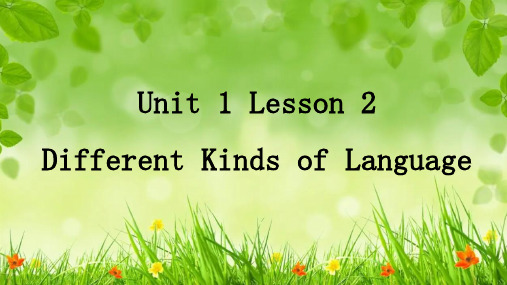
example, in British English the word “color” is spelt without the “u” and in American English “grey” is spelt “g-r-a-y” instead of “g-r-e-y”.
For use of words, the first floor in Britain is the second floor. The first floor is ground floor in British English.
For pronunciation, when we say “tomato”, a British person knows you mean “tomato”.
Presentation
Work in groups. Give a presentation on the differences between British English and American English.
Example
There are some differences between British English and American English. You can see these differences in ...
Unit 1 Lesson 2 Different Kinds of Language
Can you say it in British English and American English? British English
初中英语北师大版九年级全册《unit1 1lesson1 body language 》课件
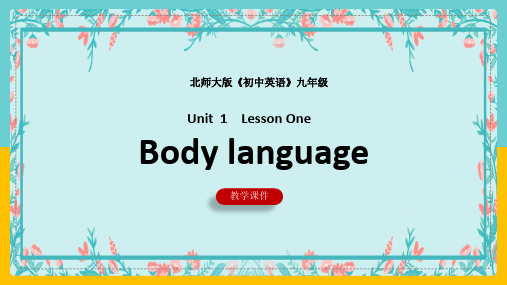
3rd –reading 4 Complete the table according to the text.
How many smile faces 能 够 匹 配 能 够 阅 读 文 能 够 比 较 流 利 的 能够在组员帮
can you get ? ( ) 肢 体 语 言 章 回 答 相 关 阅读课文
助下复述课文
和其意义 问题
Excellent
Good
Not bad
Homework
1. 听录音大声朗诵课文 2.将复述的课文内容整理 在作业本上。
is used differently , in western cultures, in Asian countries
as important as communicate with
Talk about the body languages and meanings in the text in pairs
用be used to do 连接
Nod your head 点头
show agreement
Shrug your shoulder 耸肩
show you don’t care about something
Kiss sb on the cheek 亲脸
greet each other
Shake hands
Body language is an important form of communication that is used everyw3. Read Para. 1 and answer the question.
北师大版九年级全一册 Unit 1 Language课文原文及翻译
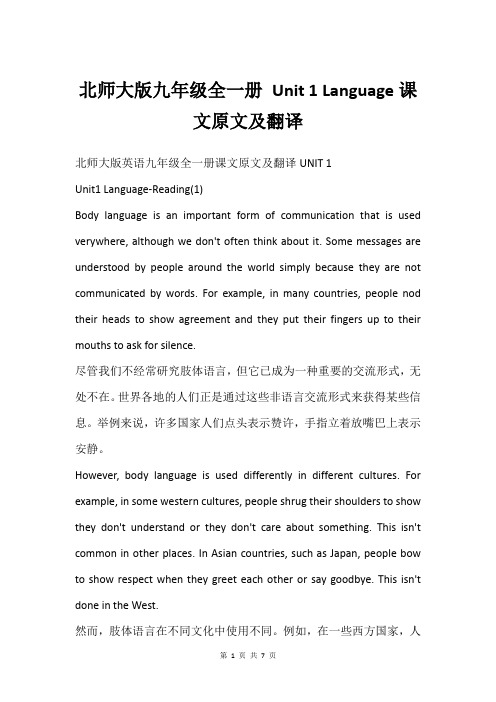
北师大版九年级全一册Unit 1 Language课文原文及翻译北师大版英语九年级全一册课文原文及翻译UNIT 1Unit1 Language-Reading(1)Body language is an important form of communication that is used verywhere, although we don't often think about it. Some messages are understood by people around the world simply because they are not communicated by words. For example, in many countries, people nod their heads to show agreement and they put their fingers up to their mouths to ask for silence.尽管我们不经常研究肢体语言,但它已成为一种重要的交流形式,无处不在。
世界各地的人们正是通过这些非语言交流形式来获得某些信息。
举例来说,许多国家人们点头表示赞许,手指立着放嘴巴上表示安静。
However, body language is used differently in different cultures. For example, in some western cultures, people shrug their shoulders to show they don't understand or they don't care about something. This isn't common in other places. In Asian countries, such as Japan, people bow to show respect when they greet each other or say goodbye. This isn't done in the West.然而,肢体语言在不同文化中使用不同。
九年级英语上册 Unit 1知识点总结 北师大版

Unit 1一、知识点1.check in :在旅馆的登记入住。
check out:在旅馆结账离开。
2.by:①通过…..方式(途径)。
例:I learn English by listening to tapes.②在…..旁边。
例:by the window/the door③乘坐交通工具例:by bus/car④在……之前,到……为止。
例:by October在10月前⑤被例:English is spoken by many people.3.how与what的区别:how通常对方式或程度提问,意思有:怎么样如何,通常用来做状语、表语。
what通常对动作的发出者或接受者提问,意思为什么,通常做宾语,主语。
①How is your summer holiday? It’s OK.(how表示程度做表语)②How did you travel around the world? I travel by air.③What do you learn at school? I learn English, ma th and many other subjects. ①What…think of…? How…like…?②What…do with…? How…deal with…?③What…like about…? How…like…?④What’s the weather like today? How’s the weather today?⑤What to do? How to do it?e.g. What do you think of this book?=How do you like this book?I don’t know what I should do with the matter.=I don’t know how I should deal with it.What do you like about China?=How do you like China?I don’t know what to do next step?=I don’t know how to do it next step?㊣What good / bad weather it is today!(weather为不可数名词,其前不能加a)㊣What a fine / bad day it is today! (day为可数名词,其前要加a)4. aloud, loud与loudly的用法:三个词都与"大声"或"响亮"有关。
